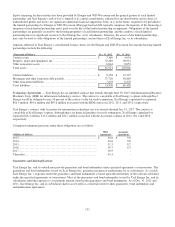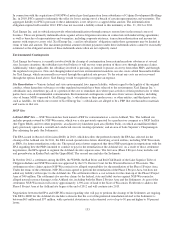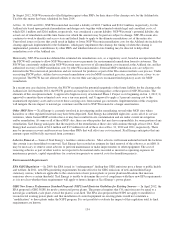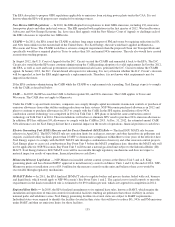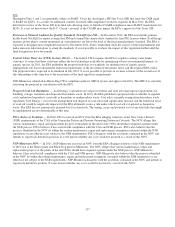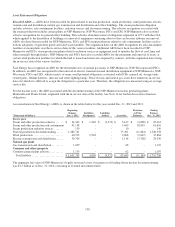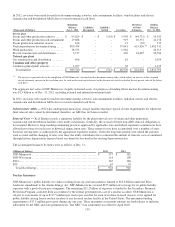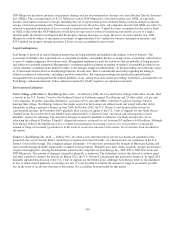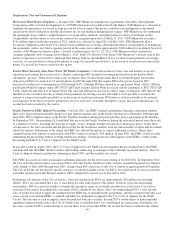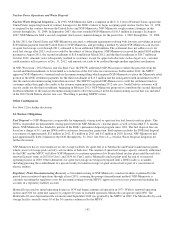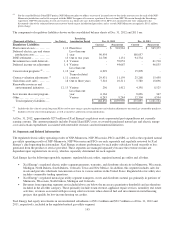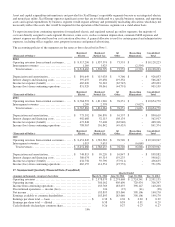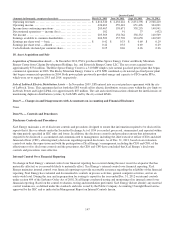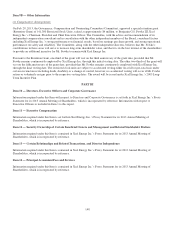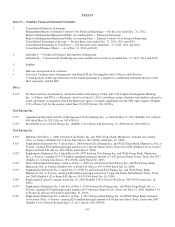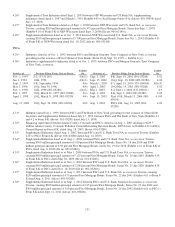Xcel Energy 2012 Annual Report Download - page 151
Download and view the complete annual report
Please find page 151 of the 2012 Xcel Energy annual report below. You can navigate through the pages in the report by either clicking on the pages listed below, or by using the keyword search tool below to find specific information within the annual report.141
Employment, Tort and Commercial Litigation
Merricourt Wind Project Litigation — In April 2011, NSP-Minnesota terminated its agreements with enXco Development
Corporation (enXco) for the development of a 150 MW wind project in southeastern North Dakota. NSP-Minnesota’s decision to
terminate the agreements was based in large part on the adverse impact this project could have on endangered or threatened
species protected by federal law and the uncertainty in cost and timing in mitigating this impact. NSP-Minnesota also terminated
the agreements due to enXco’s nonperformance of certain other conditions, including failure to obtain a Certificate of Site
Compatibility and the failure to close on the contracts by an agreed upon date of March 31, 2011. NSP-Minnesota recorded a
$101 million deposit in the first quarter of 2011, which was collected in April 2011. In May 2011, NSP-Minnesota filed a
declaratory judgment action in the U.S. District Court in Minnesota to obtain a determination that it acted properly in terminating
the agreements. enXco also filed a separate lawsuit in the same court seeking approximately $240 million for an alleged breach of
contract. NSP-Minnesota believes enXco’s lawsuit is without merit. On Oct. 22, 2012, NSP-Minnesota filed a motion for
summary judgment, with a hearing set for March 1, 2013. If the U.S. District Court denies NSP-Minnesota’s motion, trial in this
matter is expected to occur in 2013. Although Xcel Energy believes the likelihood of loss is remote based primarily on existing
case law, it is not possible to estimate the amount or range of reasonably possible loss in the event of an adverse outcome of this
matter. No accrual has been recorded for this matter.
Exelon Wind (formerly John Deere Wind (JD Wind)) Complaint — Several lawsuits in Texas state and federal courts and
regulatory proceedings have arisen out of a dispute concerning SPS’ payments for energy produced from the Exelon Wind
subsidiaries’ projects. There are two main areas of dispute. First, Exelon Wind claims that it established legally enforceable
obligations (LEOs) for each of its 12 wind facilities in 2005 through 2008 that require SPS to buy power based on SPS’
forecasted avoided cost as determined in 2005 through 2007. Although SPS has refused to accept Exelon Wind’s LEOs, SPS has
paid Exelon Wind for energy under SPS’ PUCT QF Tariff. Second, Exelon Wind has raised various challenges to SPS’ PUCT QF
Tariff, which became effective in August 2010. The state and federal lawsuits are in various stages of litigation. SPS believes the
likelihood of loss in these lawsuits is remote based primarily on existing case law and while it is not possible to estimate the
amount or range of reasonably possible loss in the event of an adverse outcome, SPS believes such loss would not be material
based upon its belief that it would be permitted to recover such costs, if needed, through its various fuel clause mechanisms. No
accrual has been recorded for this matter.
Pacific Northwest FERC Refund Proceeding — In July 2001, the FERC ordered a preliminary hearing to determine whether
there were unjust and unreasonable charges for spot market bilateral sales in the Pacific Northwest for December 2000 through
June 2001. PSCo supplied energy to the Pacific Northwest markets during this period and has been a participant in the hearings.
In September 2001, the presiding ALJ concluded that prices in the Pacific Northwest during the referenced period were the result
of a number of factors, including the shortage of supply, excess demand, drought and increased natural gas prices. Under these
circumstances, the ALJ concluded that the prices in the Pacific Northwest markets were not unreasonable or unjust and no refunds
should be ordered. Subsequent to the ruling, the FERC has allowed the parties to request additional evidence. Parties have
claimed that the total amount of transactions with PSCo subject to refund is $34 million. In June 2003, the FERC issued an order
terminating the proceeding without ordering further proceedings. Certain purchasers filed appeals of the FERC’s orders in this
proceeding with the U.S. Court of Appeals for the Ninth Circuit.
In an order issued in August 2007, the U.S. Court of Appeals for the Ninth Circuit remanded the proceeding back to the FERC
and indicated that the FERC should consider other rulings addressing overcharges in the California organized markets. The U.S.
Court of Appeals denied a petition for rehearing in April 2009, and the mandate was issued.
The FERC has issued an order on remand establishing principles for the review proceeding in October 2011. In September 2012,
the City of Seattle filed its direct case against PSCo and other Pacific Northwest sellers and has expanded the period for which it
seeks refunds to May 2000 through June 2001, during which PSCo had sales to the City of Seattle of approximately $50 million.
The City of Seattle did not identify specific instances of unlawful market activity by PSCo, but rather based its claim for refunds
on market dysfunction in the Western markets. PSCo submitted its answer case in December 2012.
Preliminary calculations of the City of Seattle’s claim for refunds from PSCo are approximately $28 million not including
interest. PSCo has concluded that a loss is reasonably possible with respect to this matter; however, given the surrounding
uncertainties, PSCo is currently unable to estimate the amount or range of reasonably possible loss in the event of an adverse
outcome of this matter. In making this assessment, PSCo considered two factors. First, not withstanding PSCo’s view that the
City of Seattle has failed to apply the standard that the FERC has established in this proceeding, and the recognition that this case
raises a novel issue and the FERC’s standard will likely be challenged on appeal to the U.S. Court of Appeals for the Ninth
Circuit. The outcome of such an appeal cannot be predicted with any certainty. Second, PSCo would expect to make equitable
arguments against refunds even if the City of Seattle were to establish that it was overcharged for transactions. In addition, if a
loss were sustained, PSCo would attempt to recover those losses from other PRPs. No accrual has been recorded for this matter.


